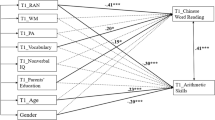Abstract
A cohort of 92 children was followed through sixth grade to investigate the relationship of preschool skills and first grade phonological awareness to reading and spelling. In particular, the focus was on the changing roles of letter naming, orthographic awareness, and phonological processing in prediction, as reading experience increased. Preschool letter naming was a consistently significant predictor of reading vocabulary, reading comprehension, and spelling at each grade level, but the preschool orthographic task contributed most to reading comprehension and spelling at the higher grades. Conversely, the contribution of the first grade phonemic awareness measures to reading skills dropped sharply after third grade, although they continued to contribute to spelling prediction. When preschool precursors of phonological processing were examined, letter naming was found to be a predictor of first and third grade phonemic awareness. Findings confirm the importance of letter naming as a predictor and of the role of phonemic awareness in early reading acquisition, but also highlight the contribution of orthographic processing skills to later reading.
Similar content being viewed by others
References
Adams, M.J. 1990.Beginning to Read: Thinking and Learning about Print. Cambridge, MA: MIT Press.
Badian, N.A. 1982. The prediction of good and poor reading before kindergarten entry: A 4-year follow-up.Journal of Special Education 16:309–18.
Badian, N.A. 1988. The prediction of good and poor reading before kindergarten entry: A nine-year follow-up.Journal of Learning Disabilities 21:98–123.
Badian, N.A. 1990. Background factors and preschool test scores as predictors of reading: A nine-year longitudinal study.Reading and Writing: An Interdisciplinary Journal 2:307–26.
Badian, N.A. 1994. Preschool prediction: Orthographic and phonological skills, and reading.Annals of Dyslexia 44:3–25.
Ball, E.W. 1993. Phonological awareness: What’s important and to whom?Reading and Writing: An Interdisciplinary Journal 5:141–59.
Berninger, V.W. 1990. Multiple orthographic codes: Key to alternative instructional methodologies for developing the orthographic-phonological connections underlying word identification.School Psychology Review 19:518–33.
Bond, G.L., and Dykstra, R. 1967. The cooperative research program in first-grade reading instruction.Reading Research Quarterly 2:5–142.
Bowers, P.G., and Wolf, M. 1993. Theoretical links among naming speed, precise timing mechanisms and orthographic skills in dyslexia.Reading and Writing: An Interdisciplinary Journal 5:69–85.
Brady, S.A., and Fowler, A.E. 1988. Phonological precursors to reading acquisition. InPreschool Prevention of Reading Failure, eds. R.L. Masland and M.W. Masland. Parkton, MD: York Press.
Chall, J.S. 1967.Learning to Read: The Great Debate. New York: McGraw-Hill.
Ehri, L.C. 1992. Reconceptualizing the development of sight word reading and its relationship to recoding. InReading Acquisition, eds. P.B. Gough, L.C. Ehri, and R. Treiman. Hillsdale, NJ: Lawrence Erlbaum Associates.
Ehri, L.C., and Wilce, L.S. 1985. Movement into reading: Is the first stage of printed word learning visual or phonetic?Reading Research Quarterly 20:163–79.
Fawcett, A.J., and Nicolson, R.I. 1994. Naming speed in children with dyslexia.Journal of Learning Disabilities 27:641–46.
Goswami, U., and Bryant, P. 1990.Phonological Skills and Learning to Read. Hove, UK: Erlbaum Associates.
Jansky, J., and de Hirsch, K. 1972.Preventing Reading Failure. New York: Harper and Row.
Koppitz, E.M. 1968.Psychological Evaluation of Children’s Human Figure Drawings. New York: Grune and Stratton.
Liberman, I.Y., Shankweiler, D., Fischer, F.W., and Carter, B. 1974. Explicit syllable and phoneme segmentation in the young child.Journal of Experimental Child Psychology 18:201–12.
Liberman, I.Y., Rubin, H., Duques, S., and Carlisle, J. 1985. Linguistic abilities and spelling proficiency in kindergarteners and adult poor spellers. InBiobehavioral Measures of Dyslexia, eds. D.B. Gray and J.F. Kavanagh. Parkton, MD: York Press.
Lundberg, I., Olofsson, A., and Wall, S. 1980. Reading and spelling skills in the first school years predicted from phonemic awareness skills in kindergarten.Scandinavian Journal of Psychology 21:159–73.
Mann, V.A., Tobin, P., and Wilson R. 1987. Measuring phonological awareness through the invented spellings of kindergarten children.Merrill-Palmer Quarterly 33:365–91.
Muter, V. 1994. Influence of phonological awareness and letter knowledge on beginning reading and spelling development. InReading Development and Dyslexia, eds. C. Hulme and M. Snowling. San Diego, CA: Singular Publishing Group.
Perfetti, C.A., Beck, L., Bell, L., and Hughes, C. 1987. Phonemic knowledge and learning to read are reciprocal: A longitudinal study of first grade children.Merrill-Palmer Quarterly 33:283–319.
Rosner, J. 1979.Helping Children Overcome Learning Difficulties. New York: Walker.
Sattler, J.M. 1974.An Assessment of Children’s Intelligence. Philadelphia: Saunders.
Share, D.L., Jorm, A.F., Maclean, R., and Matthews, R. 1984. Sources of individual differences in reading acquisition.Journal of Educational Psychology 76:1309–24.
Stahl, S.A., and Murray, B.A. 1994. Defining phonological awareness and its relationship to early reading.Journal of Educational Psychology 86:221–34.
Stanovich, K.E. 1992. Speculating on the causes and consequences of individual differences in early reading acquisition. InReading Acquisition, eds. P.B. Gough, L.C. Ehri, and R. Treiman. Hillsdale, NJ: Lawrence Erlbaum Associates.
Stanovich, K.E., Cunningham, A.E., and Cramer, B.B. 1984. Assessing phonological awareness in kindergarten children.Journal of Experimental Child Psychology 38:175–90.
Stevenson, H.W., and Newman, R.S. 1986. Long-term prediction of achievement and attitudes in mathematics and reading.Child Development 57:646–59.
Tunmer, W.E. 1991. Phonological awareness and literacy acquisition. InLearning to Read: Basic Research and its Implications, eds. L. Rieben and C.A. Perfetti. Hillsdale, NJ: Lawrence Erlbaum Associates.
Tunmer, W.E., Herriman, M.L., and Nesdale, A.R. 1988. Metalinguistic abilities and beginning reading.Reading Research Quarterly 23:134–58.
Vellutino, F.R. 1979.Dyslexia: Theory and Research. Cambridge, MA: MIT Press.
Wagner, R.K., and Torgesen, J.K. 1987. The nature of phonological processing and its causal role in the acquisition of reading skills.Psychological Bulletin 101:192–212.
Walsh, D.J., Price, G.G., and Gillingham, M.G. 1988. The critical but transitory importance of letter naming.Reading Research Quarterly 23:108–22.
Wechsler, D. 1963.Wechsler Preschool and Primary Scale of Intelligence. New York: Psychological Corporation.
Wolf, M. 1991. Naming speed and reading: The contribution of the cognitive neurosciences.Reading Research Quarterly 26:123–41.
Yopp, H. 1988. The validity and reliability of phonemic awareness tests.Reading Research Quarterly 23:159–77.
Author information
Authors and Affiliations
Rights and permissions
About this article
Cite this article
Badian, N.A. Predicting reading ability over the long term: The changing roles of letter naming, phonological awareness and orthographic processing. Annals of Dyslexia 45, 79–96 (1995). https://doi.org/10.1007/BF02648213
Issue Date:
DOI: https://doi.org/10.1007/BF02648213




